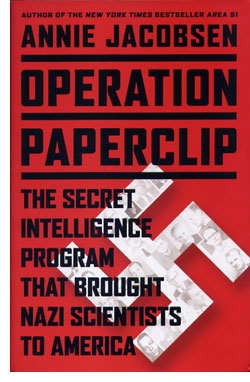 |
 Annie Jacobsen
Annie Jacobsen
Operation Paperclip: The Secret Intelligence Program That Brought Nazi Scientists to America
Little, Brown / Hachette Book Group
US Hardcover First Edition
ISBN 978-0-316-22104-7
Publication Date: 02-11-2014
578 Pages; $30
Date Reviewed: 02-23-2014
Reviewed by: Rick Kleffel © 2014
Index:
Non-Fiction
In the final days of World War II, a Dutch-American physicist named Samuel Goudsmit sits in an apartment in Strasbourg, France, rifling through the papers of a Nazi virologist. It's a tense moment. The Allies are in search of Hitler's "Wonder Weapons." It's clear from the papers that Hitler has been hard at work creating both chemical and biological weapons, as well as the feared V2 rockets. What might he be able to deliver with them?
The tension starts early and never flags in Annie Jacobsen's 'Operation Paperclip: The Secret Intelligence Program That Brought Nazi Scientists to America.' For in the midst of the chaos, as the war ends, another is being born. The war to come will be won by science, and Hitler's science and scientists will give those who harbor them an undeniable edge. But there's a moral cost to bringing these men to America. In order to protect our country, our government will have to lie to itself and us about who these men are and how they came to their positions of power and knowledge.
Jacobsen's book focuses on a small selection of scientists who were brought to America, turning a complicated, chaotic time into a pulse-pounding, page-turning, revelatory non-fiction thriller. First and foremost, Jacobsen gives her readers crisp, clear characters and a series of intense, memorable scenes. We meet American and British officers desperately combing the wreckage for clues about Hitler's wonder weapons and their creators. But we also meet the Germans; some such as Von Braun, know that they will have a place waiting for them, while others rightly fear reprisal in war crimes trials. Jacobsen handles her big cast with ease. The indelible scenes she crafts early on come back to haunt readers as we see the Nazis re-write their history, some of them becoming American heroes in the space program.
The plot of 'Operation Paperclip' is necessarily complicated. Jacobsen does fantastic job of preserving the intricate web of offers, counter-offers, kidnappings, trials and whisking-aways of the men whose lives and lies she embeds in our minds. The Nuremburg war trials figure prominently into the action, as does the inception of the Cold War. Make no mistake about it — Jacobsen is quite clear about this; all of the men we brought over with but one exception were high-level active Nazis. Most of them were in the feared SS. The worst actors, the men who performed medical experiments on prisoners of war, were not as easily brought to the US as the rocket scientists. But many creators of the Nazi nightmare were ultimately able to live the American dream.
What Jacobsen achieves here is not merely a tale of intrigue and intense tension. We did indeed need those scientists, but where Jacobsen and her book really shine is in her ability to convey the moral and ethical dilemmas and dimensions of what was done, while reserving judgment for the reader. She's quite clear that we went from merely being greedy to finding a pragmatic reason for our greed, a policy of denial to prevent the Soviets from acquiring the wherewithal to carry out their clearly intended conquest. But the level of deception that infected the government in the years as a result of Operation Paperclip helped to create an atmosphere of paranoia and a willingness to lie that has permanently undermined our trust.
'Operation Paperclip' offers quite a bit for any reader of just about any sort of book. First and foremost, it's entirely engrossing and thrilling to read. The characters are unforgettable and the plotting is as twisty as life. But it's also thought provoking and morally complex. Jacobsen weaves what we thought we knew with impeccable research and a series of stunning revelations. She crafts indelible scenes of events that inform the substructure of what we like to believe is informed democracy. At first glance, one might be tempted to think that Operation Paperclip was an afterthought. Annie Jacobsen makes it quite clear that it was an aftershock, the first of many that ripple through to this day and the next.
|
 |




